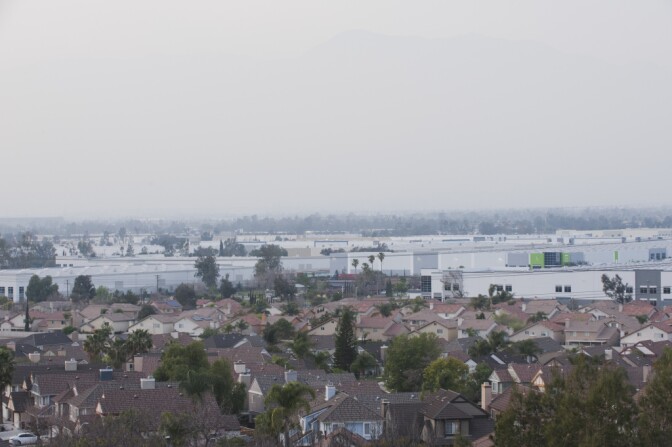This story is free to read because readers choose to support LAist. If you find value in independent local reporting, make a donation to power our newsroom today.
A Warehouse Boom In Fontana Meant Increased Pollution. Residents Fought Back — And Won

South Fontana has seen an explosion of warehouse construction in the last decade—one result of our reliance on conveniently shipped goods.
But with warehouses come diesel trucks that create dangerous air pollution, as well as noise and traffic. And most of these warehouses end up in neighborhoods that are already overburdened by pollution—like South Fontana.
Concerned about the health of her own children, and the children in her community, resident Liz Sena decided to take action. She started the South Fontana Concerned Citizens Coalition and partnered with the Sierra Club and other environmental justice advocates to pressure local leaders to stop approving warehouse projects—or at least require developers to lessen the pollution they cause.
Their efforts resulted in the state attorney general suing the city of Fontana last year for approving, without proper environmental review, a 205,000 square-foot warehouse project next to a high school in a South Fontana neighborhood that already suffers from some of the highest pollution levels in California.
Today, Attorney General Rob Bonta announced a settlement that will require all future warehouse development in Fontana to have the strictest environmental standards in the state. Though Sena expressed sadness that the project wasn’t halted altogether, both she and Bonta said they hope the win will be an inspiration—and a policy pathway—for other communities disproportionately impacted by pollution across the state.
“Change can be done when the community says ‘enough is enough' and chooses to stand up and speak,” Sena said at a press conference in downtown L.A. on Monday.
Among other things, the settlement creates an ordinance that requires all new warehouse projects in the city of Fontana to keep truck routes away from places such as schools and daycares, install solar panels that provide 100% of the power needed for large warehouses, and use more electric vehicles on site.
The settlement also requires the developer of the specific warehouse the lawsuit was about—the Slover and Oleander warehouse project by developer Duke Realty—to establish a $210,000 community benefit fund for improving landscaping buffers at Jurupa Hills High School, which is next to the warehouse, and to purchase and distribute a five-year supply of high quality air filters to up to 1,750 households in the surrounding community.
Lastly, the settlement pushed the South Coast Air Quality Management District, the government agency that regulates sources of air pollution in southern California, to revise its guidelines. The new revisions would require cities to consider existing and cumulative sources of pollution in a community—and their impact on human health—when deciding where to build new projects.
“Today is a great day for the city of Fontana and its residents,” said Sena. “It marks the culmination of our community's efforts coming together to protect our city's most precious resource—our children.”
In an emailed statement, the city of Fontana said it was proud to lead the way in warehouse environmental standards.
“We are in agreement with Attorney General Bonta – this ordinance should serve as a model for other local governments across the State," said Mayor Acquanetta Warren.








